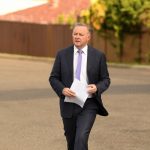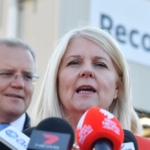Homeward bound: Australia gets even smarter
Australia has matured in regard to recognising the importance of the Broadband Economy. Social entrepreneur and initiator of the global Intelligent Community movement Louis Zacharilla highlights the power of Broadband to unite the country and in particular benefit rural areas.
While I have not read of his candidacy, I would like to inject a new candidate into the Australian national election: Albert Einstein. Or at least his words.
While he could no doubt unravel the complexities of the nation’s voting system to an inexperienced American, of more importance he viewed the human community as a connected network, and strove to demonstrate its physical universality in theories that could be mathematically demonstrated.
His scientific approach is instructive to modern governance. It is important to view what the Intelligent Community movement calls the Broadband Economy in a similar fashion. As my colleague Robert Bell wrote for an upcoming issue of Mayors & Cities magazine, “We are no longer asking whether we need broadband, we are now asking ‘who will pay for it?’”
The acceptance of broadband as the new economic enabler is increasingly universal and the five criteria for establishing a foundation for change are widely embraced by governments.
It was encouraging to have visited Australia recently and to have heard how, to a person, the NBNCo., and the issues surrounding a ubiquitous, high-speed “information railroad” had turned away from pointed debates over need, and toward value creation and application along the paths of the network.
It was very heartening to hear it put within the context of solving the acute problems of rural and “remote” communities as well. During my visit to Brisbane people did not ask me whether change was necessary, but how to build so that broadband and Intelligent Communities profitably serve the needs of cities and communities.
I was asked what success would look like? I turn again to Einstein who remarked, “Strive not to be a success but to be of value.”
Cities and communities will be successful if they embrace change. This is true in Australia in the same way it has become true in Taiwan, Canada and Finland, three hotbeds of Intelligent Community development.
These cities are of value because they have collaboratively launched a new infrastructure. This new infrastructure has had many social and economic consequences. It has enabled schools, hospitals, governments and local economies to connect in such a way that they remain both modern, desirable and attract inward investment. In the case of the rural sectors, they successfully preserve centuries of heritage and make traditional sectors of the economy flourish again. Our perception is that soon the rural will become the hippest part of the global community!
Of all the extraordinary turnarounds we have witnessed worldwide, those that have successfully managed to implement programs that give a “new voice to old truths” are the most exciting.
Places once considered to be in the “middle of nowhere” have attracted talent, and the community’s youth return or remain. They have done this by improving access to knowledge. This has been of value by improving and unleashing the endless energy from the one tool we know will be needed to succeed: our human mind. The most remarkable social and spiritual “software” ever known.
Economically, culture is capital. By preserving heritage, no one surrenders anything and gains much from the change. When change is welcomed, innovation goes on a rampage. Think Silicon Valley, of course. But also look to places no one has heard of, like Eindhoven (The Netherlands), Suwon (South Korea) and Waterloo (Canada). The World Wealth Report says these places will dominate the discussion about a reinvention of “place” over the coming decades.
There is also Stratford, Canada and Mitchell, South Dakota (USA), each of which has used broadband to unleash cultural and agricultural innovation and enjoy low unemployment rates. The value created by combining broadband with good, rational policies has resulted in a talent surge into these communities.
Last year I was honored to have seen a performance by the Australian group Black Arm Band. The beauty and potential of your nation’s culture, as I wrote, has stayed with me since. I continue to promote the nation and its new initiative as one that the world must watch, for I believe it will draw all of us “home” again.
Louis Zacharilla is a social entrepreneur who is credited with initiating the global Intelligent Community movement. As the Co-Founder of the New York-based Intelligent Community Forum, a global think tank and foundation which studies “energized communities” for the new century. He helps community thought leaders to understand and implement the best practices of the world’s leading communities. For more information visit www.intelligentcommunity.org.















